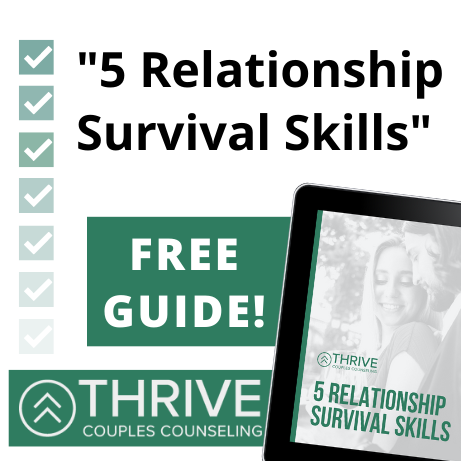
What If I’m Not Sure I Want to Stay in My Marriage?!
Many people start seriously contemplating couples therapy after things have become so bad that they are internally debating if they should work harder on their relationship or if it would be better to just end it.
People often describe years of trying to make things work. Years of hundreds of little hurts and often some pretty big ones too. They worry about the kind of relationship they are modeling for their children and wonder if ending things would actually benefit their children more than staying together.
They say that the marriage they currently have is not a marriage that they want and they’re struggling to stay invested in it based on what they hope it will become.
If you can’t decide if you want to work on your relationship or walk away from it, here are a few questions that I’d encourage you to ask yourself:
- What was your relationship like when you considered it “good’? And how long ago was that?
- When it last felt “good” to you, was it the kind of relationship that you would want for yourself now?
- What have you done to work on improving your relationship? Has your focus been on how you could make things better or how your partner could make things better?
- Do you have a clear understanding of the relationship your partner is saying they want? Are they asking for objectively healthy relationship traits, like respect, honesty, patience, and intimacy, or are they requesting a relationship that is nothing like what you want?
These questions will not point you to the “right” decision, but will encourage you to think about your relationship’s potential and if you think there is room for change to take place.
If you still feel unsure but feel compelled to try couples therapy before giving up hope, here’s my suggestion:
Commit to Therapy
Commit in your mind to a certain amount of time that you will attend therapy to see if it is possible for things to improve.
I often suggest anywhere from 2 months to a year, depending on a variety of factors. During that time, your job is to collect as much information about your partner, about yourself, and about your relationship, as you can.
Make a List of Ways to Measure Improvement
Make a list of ways you could measure improvement at the end of your chosen timeline.
Like nobody storms out of the house or even the room when there is conflict, or you find yourself wanting to be around your partner just a bit more than before.
Hold back from trying to make any decisions during this time. When things feel challenging, remind yourself that you are in a gathering information stage.
Collect & Evaluate
Collect all of the information and evaluate if things have improved enough
When the timeframe you decided on has ended, collect all of the information and evaluate if things have improved enough for you to want to keep working on things. “Working on things” doesn’t mean you’re in it forever.
Set Another Time Frame, Evaluate, & Repeat
Set another time frame, collect more information, evaluate it all when that timeframe has ended and repeat. At a certain point the pendulum will swing far enough one way or the other for you to make a more solid decision.
You don’t have to navigate these decisions alone. Schedule an appointment, whether individually or with your partner, and begin moving toward a clearer future. I would be happy to help!

